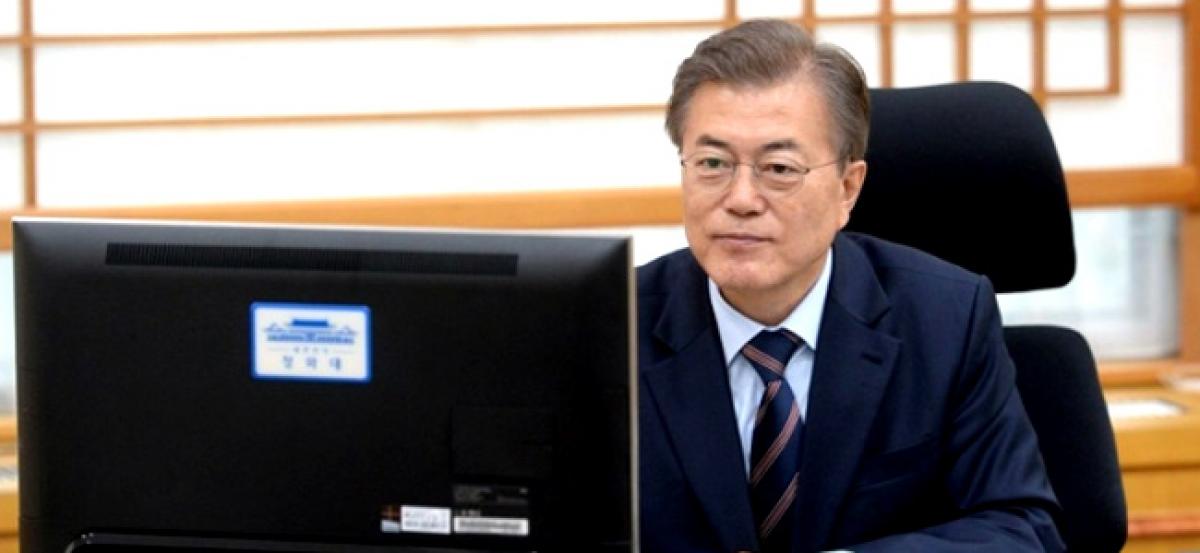Live
- Taluk Guarantee panel
- Uber Launches Uber Moto Women for Safer and Flexible Rides in Bengaluru
- ‘Fear’ pre-release event creates waves
- Champions Trophy 2025 Host Change? Indian Broadcaster's Promo Sparks Controversy
- Nabha Natesh introduced as Sundara Valli from ‘Swayambhu’
- Aamir Khan praises Upendra's ‘UI: The Movie’ ahead of its release
- Celebrations: Keerthy Suresh ties the knot with Antony Thattil
- Indian scientists develop flexible near-infrared devices for wearable sensors
- Wordle Answer and Hints for Today (December 12, 2024) – Solve Wordle #1272
- Kiara blazing through fashion and film
Just In
South Korea: President Moon Jae-in scraps controversial plan for state history books


New South Korean President Moon Jae-in on Friday scrapped a controversial plan to introduce state-issued history textbooks at schools, erasing a key policy of his ousted conservative predecessor Park Geun-hye.
New South Korean President Moon Jae-in on Friday scrapped a controversial plan to introduce state-issued history textbooks at schools, erasing a key policy of his ousted conservative predecessor Park Geun-hye.
Moon's order to the education ministry was based on his "firm will" that history education should not be politicised, the presidential Blue House said.
Many historians and teachers had opposed Park's plan to introduce textbooks edited by the government at middle and high schools, seeing it as an attempt to whitewash the brutal dictatorships that preceded the country's democratic transition during the late 1980s. Park's father was a dictator.
"State-issued history textbooks are a symbol of the rigid history education of the past and also represent a type of education that divides people by forcing them to take sides," presidential spokesman Yoon Young-chan said today.
Strong resistance to Park's plan forced her government to delay the planned introduction of the textbooks from 2017 to 2018. The education ministry, which had initially said schools would be forced to use state-issued textbooks, took a softer turn in January, saying schools would continue to have the freedom to use textbooks by private publishers after 2018.
The ministry's change in stance came amid rising public anger over a corruption scandal involving Park. She was eventually removed from office and arrested in March over allegations of bribery, extortion and abuse of power, charges that could potentially send her to jail for life.
Park's removal from office triggered a May 9 presidential by-election that the liberal Moon won. He took office Wednesday.
Park's father is slain military strongman Park Chung-hee, who ruled South Korea in the 1960s and '70s, and whose legacy as a successful economic strategist is marred by a record of vicious civilian oppression. He introduced state-issued history textbooks in 1974, two years after he declared martial law amid widening student protests and rammed through a new constitution that effectively made him president for life. He was killed in 1979.
It was not until the early 2000s when South Korea began liberalizing the production of history textbooks, and since 2011, all history books used in middle and high schools have been written by private publishers.
In calling for the need for state-issued history textbooks, Park Geun-hye had argued it was important for history education to inspire patriotism in students and that existing textbooks were too left-leaning and encouraged views sympathetic to North Korea.

© 2024 Hyderabad Media House Limited/The Hans India. All rights reserved. Powered by hocalwire.com






